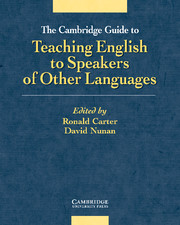Book contents
- Frontmatter
- Contents
- List of figures
- List of abbreviations
- Acknowledgements
- List of contributors
- Introduction
- Chapter 1 Listening
- Chapter 2 Speaking
- Chapter 3 Reading
- Chapter 4 Writing
- Chapter 5 Grammar
- Chapter 6 Vocabulary
- Chapter 7 Discourse
- Chapter 8 Pronunciation
- Chapter 9 Materials development
- Chapter 10 Second language teacher education
- Chapter 11 Psycholinguistics
- Chapter 12 Second language acquisition
- Chapter 13 Bilingualism
- Chapter 14 Sociolinguistics
- Chapter 15 Computer-assisted language learning
- Chapter 16 Observation
- Chapter 17 Classroom interaction
- Chapter 18 English for academic purposes
- Chapter 19 English for specific purposes
- Chapter 20 Assessment
- Chapter 21 Evaluation
- Chapter 22 Syllabus design
- Chapter 23 Language awareness
- Chapter 24 Language learning strategies
- Chapter 25 Task-based language learning
- Chapter 26 Literature in the language classroom
- Chapter 27 Genre
- Chapter 28 Programme management
- Chapter 29 Intercultural communication
- Chapter 30 On-line communication
- Postscript: The ideology of TESOL
- Glossary
- References
- Index
Chapter 1 - Listening
Published online by Cambridge University Press: 07 September 2010
- Frontmatter
- Contents
- List of figures
- List of abbreviations
- Acknowledgements
- List of contributors
- Introduction
- Chapter 1 Listening
- Chapter 2 Speaking
- Chapter 3 Reading
- Chapter 4 Writing
- Chapter 5 Grammar
- Chapter 6 Vocabulary
- Chapter 7 Discourse
- Chapter 8 Pronunciation
- Chapter 9 Materials development
- Chapter 10 Second language teacher education
- Chapter 11 Psycholinguistics
- Chapter 12 Second language acquisition
- Chapter 13 Bilingualism
- Chapter 14 Sociolinguistics
- Chapter 15 Computer-assisted language learning
- Chapter 16 Observation
- Chapter 17 Classroom interaction
- Chapter 18 English for academic purposes
- Chapter 19 English for specific purposes
- Chapter 20 Assessment
- Chapter 21 Evaluation
- Chapter 22 Syllabus design
- Chapter 23 Language awareness
- Chapter 24 Language learning strategies
- Chapter 25 Task-based language learning
- Chapter 26 Literature in the language classroom
- Chapter 27 Genre
- Chapter 28 Programme management
- Chapter 29 Intercultural communication
- Chapter 30 On-line communication
- Postscript: The ideology of TESOL
- Glossary
- References
- Index
Summary
Introduction
The term listening is used in language teaching to refer to a complex process that allows us to understand spoken language. Listening, the most widely used language skill, is often used in conjunction with the other skills of speaking, reading and writing. Listening is not only a skill area in language performance, but is also a critical means of acquiring a second language (L2). Listening is the channel in which we process language in real time – employing pacing, units of encoding and pausing that are unique to spoken language.
As a goal-oriented activity, listening involves ‘bottom-up’ processing (in which listeners attend to data in the incoming speech signals) and ‘top-down’ processing (in which listeners utilise prior knowledge and expectations to create meaning). Both bottom-up and top-down processing are assumed to take place at various levels of cognitive organisation: phonological, grammatical, lexical and propositional. This complex process is often described as a ‘parallel processing model’ of language understanding: representations at these various levels create activation at other levels. The entire network of interactions serves to produce a ‘best match’ that fits all of the levels (McClelland 1987; Cowan 1995).
Background
Listening in language teaching has undergone several important influences, as the result of developments in anthropology, education, linguistics, sociology, and even global politics. From the time foreign languages were formally taught until the late nineteenth century, language learning was presented primarily in a written mode, with the role of descriptive grammars, bilingual dictionaries and ‘problem sentences’ for correct translation occupying the central role.
- Type
- Chapter
- Information
- Publisher: Cambridge University PressPrint publication year: 2001
- 33
- Cited by



